HMYOI Werrington 'found to be less safe'
- Published

The use of force on teenagers at HMYOI Werrington had increased since a previous inspection, a report said
A young offender institution has been found by inspectors to have become less safe.
The number of assaults on teenagers at HMYOI Werrington was "high" and violence against staff had doubled since a previous inspection, chief inspector of prisons Peter Clarke said.
It was found in February to have become less safe since being visited in 2018.
Out of four areas tested three were found to be reasonably good, apart from safety.
Outcomes for teenagers were judged to be "not sufficiently good" for safety. Other areas tested were care, purposeful activity and resettlement.
Following the publication of the HM Inspectorate of Prisons report, Mr Clarke said many examples of low-level poor behaviour not being challenged were seen at the institution near Stoke-on-Trent, which holds about 120 boys aged 15 to 18.
It stated the use of force on teenagers had increased since the previous inspection, although incidents of force remained lower than other similar establishments.
Campaign group The Howard League for Penal Reform said it received 23 calls in the last year about boys at the establishment through its free legal advice line.
The report was "the latest in a long line of inspections and inquiries that have shown prisons holding children to be fundamentally unsafe" and unable to meet "their most basic needs", the charity's director of campaigns, Andrew Neilson, said.
Prison and probation service executive director of the Youth Custody Service Helga Swidenbank said she was pleased inspectors had recognised "the large amount of positive work taking place" at Werrington.
This included "good healthcare and education, and the strong relationships staff have developed with the boys in their care".
She said: "While violence is a challenge across the youth estate, the new governor has already started to implement plans to reduce it, review behaviour management and improve the one-to-one support for every boy."

Follow BBC West Midlands on Facebook, external, on Twitter, external, and sign up for local news updates direct to your phone, external.